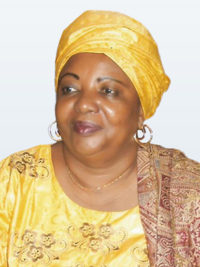|
Getting your Trinity Audio player ready…
|
Seoul, South Korea – The 2023 InternationaI Women’s Peace Conference held yesterday during the Heavenly Culture, World Peace, Restoration of Light (HWPL) World Peace Conference running under the theme “MuItidimensionaI RoIe of Women for SustainabIe Peace” brought to the fore the importance of peace education in the promotion of harmony and sustainable development.
H.E. Hon. Aya Benjamin Libo Warille, the Minister of Gender, Child and Social Welfare of South Sudan, speaking during the women’s summit, said there is a need to ensure sustainable peace in the world.
“We gather here to share what we have, ranging from the ideas roaming around in our minds to our real-world experiences; all towards our visions of a more peaceful world. As South Sudanese, we have first-hand experience of wars. We know the consequences of conflict. It has broken families, communities, and the initial bustling hope we had as a nation. People are displaced and subjected to violations that have serious effects on their mental health. This can affect the performance of the population if not well addressed; it manifests in every aspect of life and may contribute to cycles of conflict,” she said.
Dr. Kadia Maiga Diallo Secretary General of the National Commission of Mali for UNESCO, said war hinders the learning capabilities and social productivity of women and girls.
“This is why we must build peace and prevent conflicts through women’s peace education. The Constitution of UNESCO clearly states the purpose of peace education in the first sentence. It starts with “Since wars begin in the minds of men, it is in the minds of men that the defenses of peace must be constructed.” Thus, peace starts in the minds of people. Political, and economic agreements and treaties between states can only bring peace temporarily. For eternal peace, we need an intellectual, moral foundation on which we must build mutual understanding and knowledge. UNESCO is clearly aware of this.
“Johan Galtung, the pioneer of peace education, has said that 3 things, peace education, peace research, and peace activism, must come together to continue to fight against social evil, break through the status quo, and reach social change. Peace education is an important element that changes a culture of violence to a culture of peace,” Dr. Diallo said.
Mali has been going through a period of instability and conflict since 2012, culminating in the occupation of the north by armed groups. Mali is about twice as big as France. Its capital Bamako has 2,929,373 inhabitants in 2023 due to the insecurity that has caused the population to move from the north to the south and mainly to the capital (375,000 displaced people in Mali).
Ms. Néziha Labidi, the Former Minister for the Women, Family, Children, and Seniors of Tunisia, said women leaders should provide solutions to problems such as the lack of security and stability, pandemics, natural disasters, and violence against women, children and the elderly who are often used as weapons of war, as shields and forcibly recruited into armed conflicts that are eating away at our respective societies.
“Addressing the issue of peace and security is at the very heart of all development and respect for human rights. There can be no human life without dignity. When women participate in peace negotiations, the resulting agreements have a 35% chance of lasting at least 15 years. Spinoza considered that “peace is not the absence of war, it is a virtue, a state of mind, a will to benevolence, trust and justice”, she said.
This year, the world will be celebrating the 23rd anniversary of Security Council Resolution 1325 on women, peace, and security. In October, it will be marking the 16 days of activism to combat violence against women; and is on the threshold of the celebration of International Human Rights Day. These are moments to reflect on and take a step back from daily lives and the lives of people suffering from exodus, famine, all kinds of wars, and stateless people wandering here and there without roots or wings.
“In addition to the various conferences and platforms, we are looking for new approaches to achieving greater gender equity, and so we find ourselves faced with feminist diplomacy, a concept that originated in Sweden with former foreign affairs minister Margot Waffstrom and is still in its infancy. The global context supports this drive for peace and security in order to achieve the 2030 goals in connection with the African Union Agenda 2063 which places a significant emphasis on achieving a peaceful and secure Africa and harnessing the potential of women.
“In particular, according to Goal 17, empowering women and girls and eradicating violence and discrimination against them should be prioritized, and full gender equality should be achieved in all aspects of life. Women’s peace education is a crucial means to teach women and girls about their rights and how to protect them, providing them with the essential foundation to become integral members of society and leaders,” Ms. Libidi added.
